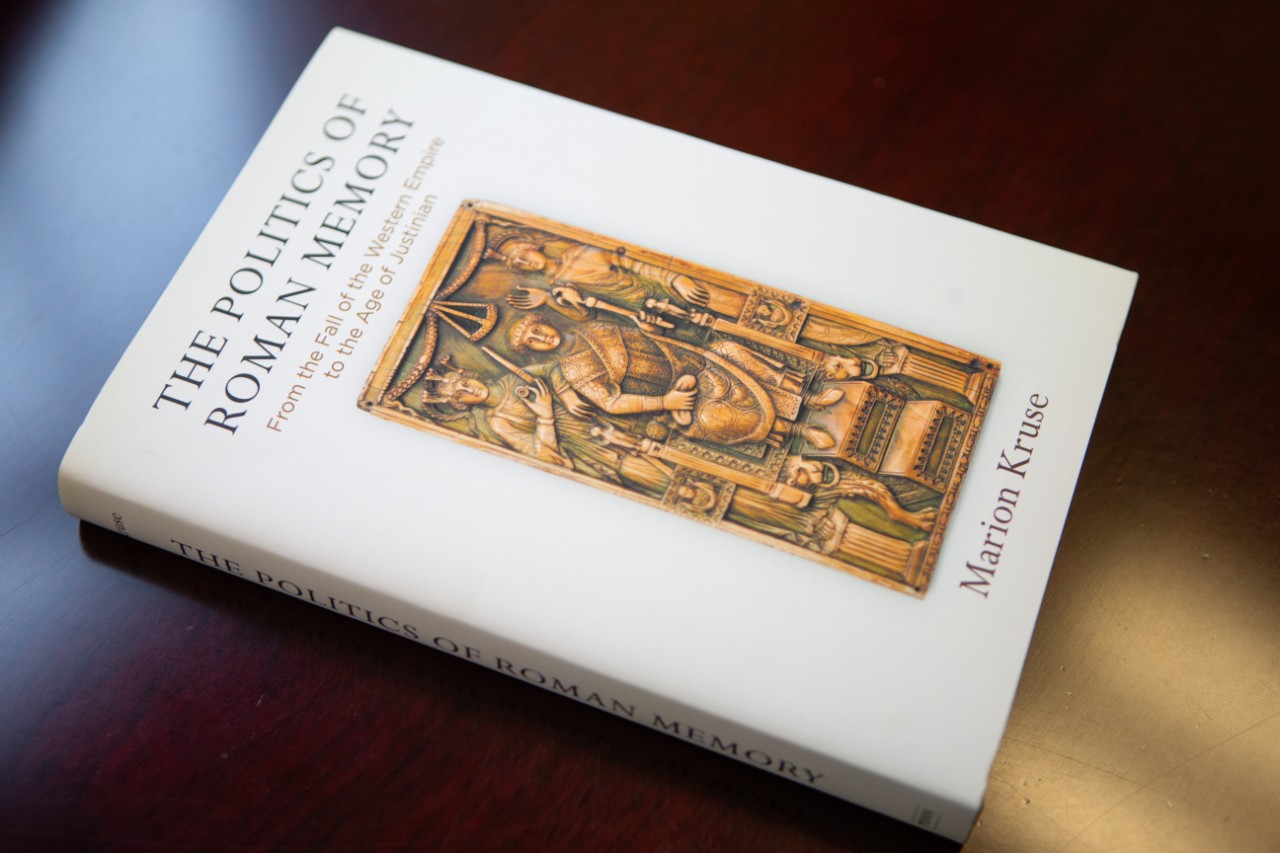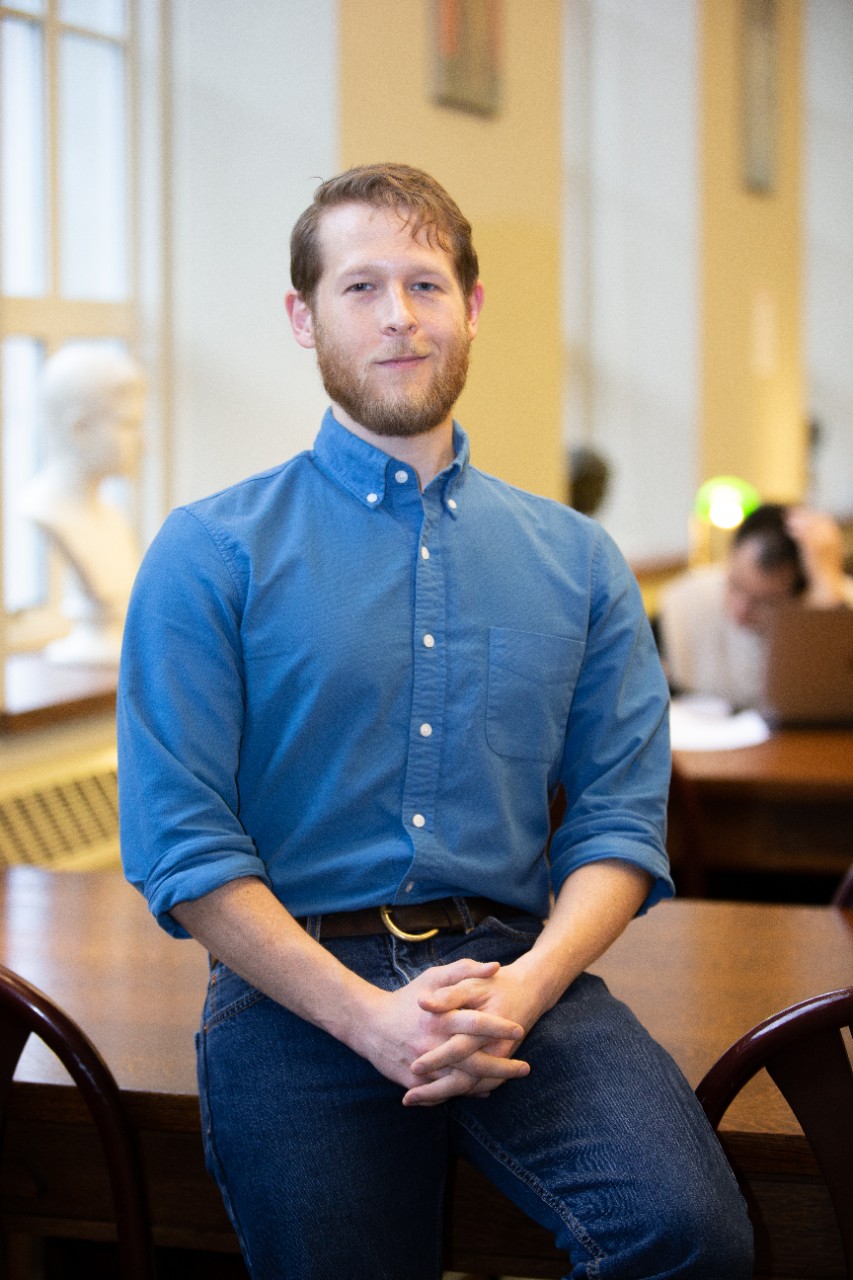
UC historian explores Roman identity after fall of Rome
Classics professor Marion Kruse is author of 'The Politics of Roman Memory'
A new book by University of Cincinnati assistant professor Marion Kruse examines the way emperors, poets and bureaucrats in the eastern Roman Empire used a combination of history and mythology to reaffirm their identity after the fall of Rome.

UC classics professor Marion Kruse is author of the new book "The Politics of Roman Memory." Photo/Andrew Higley/UC Creative Services
“The Politics of Roman Memory: From the Fall of the Western Empire to the Age of Justinian” explores poems, histories and ancient law to piece together how identity evolved in the eastern Roman empire in response to the fall of the western Roman empire.
“In traditional Roman history classrooms, they will tell you Rome fell in A.D. 476 when the emperor, Romulus Augustulus, was deposed,” Kruse said.
But by then, Kruse said, the eastern Roman Empire (today known as the Byzantine Empire) had risen to prominence both in population and economic standing. Constantinople, the capital and the site of present day Istanbul, Turkey, was a flourishing city completely independent of Rome.
“They had separate capitals, but they shared a legal system. They shared a culture. They understood they belonged to a common political system,” Kruse said.
“So my question is what was the reaction? What happens if you are a Greek-speaking Roman living in Constantinople in 476 and you hear the western Roman Empire is gone?” Kruse said.
“And 50 years later, the western empire is still gone. How are you responding to that? What cultural and political changes are necessary to come to terms with the reality that something inconceivable happened but way over there in the west?”

A mozaic of Roman emperor Justinian. Photo/Sharon Mollerus/Wikimedia Commons
His book investigates how the fall of Rome influenced political rhetoric in Constantinople. They believed that they were the only Romans deserving of the name, Kruse said.
Kruse is an assistant professor of classics in UC’s McMicken College of Arts and Sciences. His previous research has examined other influential authors and events during this remarkable period of history.
University of California San Diego history professor Edward Watts called the book “an exciting addition to the scholarship” of the eastern Roman Empire.
University of Tennessee Knoxville history professor Jacob Latham praised the book as well.
“Highlighting an often overlooked group of authors and a time period often bypassed by memory studies, Marion Kruse persuasively articulates the ongoing but changing significance of the city of Rome for literate elites of early- to mid-sixth century Constantinople,” Latham said.
Even today, Rome affects how we think about history, what we think is possible and what historical outcomes we’re afraid of.
Marion Kruse, Assistant Professor of Classics
Kruse relied on diverse sources to unpack the politics and beliefs of the eastern Roman Empire.
“Histories began to be written at the end of the fifth century that put what happened to the western Roman Empire in context,” he said. “The first explicit statement that the western Roman Empire had fallen was 514 in the chronicle of Marcellinus Comes. He’s the first to say it that bluntly.”
One surprising source was the legislation drafted by the emperor Justinian — some 160 laws, each accompanied by a lengthy preamble.
“All ancient laws were published with these elaborate justifications for why they were made that expressed the priorities and propaganda of the regime,” Kruse said. “But these are just about the only ones that survive.”

Marion Kruse authored "The Politics of Roman Memory."
The laws covered topics such as divorce, church property, dock fees and morality. One law prescribed the death penalty for deaconesses who committed adultery.
“Justinian was trying to draft this history and justification for the fall of the western Roman Empire while also explaining why he was going to reconquer it and why he is going to succeed where others had failed,” Kruse said.
Some writers at the time pushed back on Justinian’s version of contemporary history on topics such as his abolition of the consulship, the oldest surviving Roman office, Kruse said.
“When people are writing histories of the emperor Justinian, they take these formulations in the laws as jumping-off points and respond to them,” Kruse said.
He said modern politics leans on shared historical memory in much the same way. Think of how candidates invoke America’s Founding Fathers to discuss policy.
“In a sense, Rome never fell. Its history never ended. It just moved east. And even today, Rome affects how we think about history, what we think is possible and what historical outcomes we’re afraid of,” he said.

UC assistant professor Marion Kruse writes about the reaction of the eastern Roman empire to the fall of Rome in his new book. Photo/Andrew Higley/UC Creative Services
Next Lives Here
The University of Cincinnati is classified as a Research 1 institution by the Carnegie Commission and is ranked in the National Science Foundation's Top-35 public research universities. UC's graduate students and faculty investigate problems and innovate solutions with real-world impact. Next Lives Here.
Become a Bearcat
- Apply online or get more information about undergraduate enrollment by calling 513-556-1100.
- Learn more about UC's many undergraduate and graduate programs.
Related Stories
President Pinto celebrates 2024: A year in review
December 12, 2024
University of Cincinnati President Neville G. Pinto shares a message and year-in-review highlights as UC's 2024 comes to a close
Photography inspires UC student to chart new path
December 12, 2024
University of Cincinnati photojournalism student Mayea Salmon parlayed an internship at a sports apparel company into a job offer.
6 enterprising startup ventures graduate from UC’s Venture Lab
December 12, 2024
The University of Cincinnati’s Venture Lab graduated its six newest startup ventures, with the cohort’s demo day attracting attention from entrepreneurs and potential investors.
